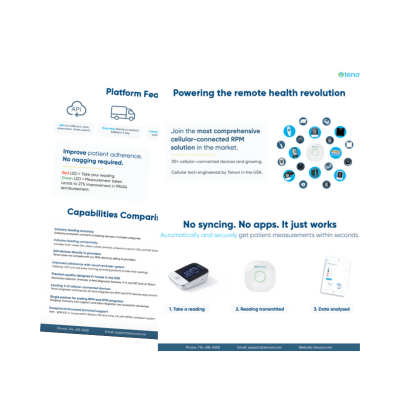Remote therapeutic monitoring (RTM) allows providers to track non-physiological data from medical devices and observe patient responses to prescribed therapies outside traditional clinical settings.
This article answers the question of what is remote therapeutic monitoring, how it differs from remote patient monitoring (RPM), the types of conditions it covers, Medicare billing details, and the role of Tenovi’s RTM solutions.
What is Remote Therapeutic Monitoring?
To better understand the question, what is remote therapeutic monitoring? We will review how it encompasses collecting and analyzing non-physiological data related to musculoskeletal and respiratory therapy adherence and response. With RTM, physicians can monitor medication adherence and therapy progress for musculoskeletal and respiratory disorders, ultimately enhancing patient care and outcomes.
Unlike RPM, which focuses on vital signs and physiological data, RTM tracks therapeutic data such as medication adherence, device usage, pain levels, and therapy adherence. Not all health insurance plans cover remote therapeutic monitoring, but Medicare does. RTM primarily focuses on the following two categories of conditions.
Musculoskeletal (MSK) Conditions
In exploring what is remote therapeutic monitoring, it’s important to understand that it can track therapy progress and medication adherence for MSK conditions. Remote therapeutic monitoring can track therapy progress and medication adherence for conditions including:
- Arthritis
- Chronic joint pain
- Back and neck conditions
- Post-surgical rehabilitation
- Chronic pain management
Respiratory Conditions
Remote therapeutic monitoring devices collect data on a patient’s respiratory system. For example, a peak flow meter measures forced expiratory volume (FEV) and can be used to manage conditions like asthma and chronic obstructive pulmonary disease (COPD). RTM supports monitoring of:
- Asthma
- Chronic Obstructive Pulmonary Disease (COPD)
- Bronchitis
- Other chronic respiratory conditions
RTM for Medication Adherence Tracking
Medication adherence remains a challenge in healthcare management. According to the World Health Organization, approximately 50% of patients with chronic conditions don’t take their medications as prescribed. This non-adherence can lead to increased hospitalizations, poor health outcomes, higher healthcare costs, and disease progression.
Tenovi currently offers three comprehensive medication adherence tools designed to improve medication adherence and patient outcomes. Tenovi RTM and RPM devices can all be connected to one cellular gateway, enabling value-based quality care at home that manages care costs and drives new revenue.
Medicare-Eligible Medication Tracking Systems
Medication tracking systems that qualify for Medicare reimbursement under RTM must meet specific criteria, including automated data collection and transmission to healthcare providers. These systems typically include smart pill bottle caps, automated pill dispensers, and digital medication adherence platforms that track patient usage in real time. To be eligible for Medicare reimbursement, the device must support CPT codes 98976 (medication adherence monitoring), 98977 (musculoskeletal monitoring), and 98980 or 98981 (RTM treatment management services).
Examples of qualifying systems include cellular-connected smart pill caps, Bluetooth-enabled pill dispensers, and integrated medication adherence platforms that transmit data to providers without requiring patient input.
Physicians and qualified healthcare professionals can order and bill for RTM services for qualifying respiratory or musculoskeletal conditions under the following specific CPT codes.
- CPT 98976: Respiratory monitoring device supply
- CPT 98977: Musculoskeletal monitoring device supply
- CPT 98980: First 20 minutes of RTM treatment management services
- CPT 98981: Each additional 20 minutes of RTM treatment management services
The following sections detail Tenovi’s medication adherence solution offering, including the Tenovi Pillbox, the PatchRx Smart Pill Bottle Cap, and the Adherium Hailie Sensors. Each of these devices plays a key role in remote therapeutic monitoring by providing automated tracking and real-time data transmission to support patient adherence and clinical decision-making
The Tenovi Pillbox System
The Tenovi Pillbox is used for multi-medication adherence tracking. It enables precise tracking of medication adherence for both MSK and respiratory conditions. The Tenovi Pill Box offers the following features.
- Cellular connectivity for automatic data transmission
- Integration with care management platforms
- Visual LED reminders (red in the morning, green after medication is taken)
- Seamless API integration
PatchRx for Critical Medication Monitoring
Tenovi’s ecosystem also includes PatchRx Smart Pill Bottle Cap, a universally fitting cap that helps patients and providers track adherence to one or two critical medications. It automatically detects and logs each time the bottle is opened or closed, transmitting this data in real time. Designed for ease of use, the smart cap seamlessly integrates into patients’ routines while providing valuable adherence insights.
Adherium Advanced Inhaler Adherence for Respiratory Care
Adherium Hailie® Sensors track medication usage to reduce the number of asthma and COPD attacks. With five next-generation, FDA-cleared sensors covering the 10 most common inhaled medications, these inhalers drive better outcomes and reduce costs. Adherium estimates a potential 40% cost reduction (~$1,500) per asthma patient annually, offering a $17 billion savings opportunity in U.S. healthcare.
*Adherium clinical outcomes mapped against cost drivers to estimate cost savings per patient for uncontrolled patients
Understanding the Question — What is Remote Therapeutic Monitoring?
For detailed information about compatible medications and implementation, you can download the following resources.
- Tenovi Pill Box Medication Compatibility List
- Tenovi Complete RTM Medication Adherence Solutions Overview
Remote therapeutic monitoring provides healthcare providers with effective tools to track and improve patient adherence while qualifying for appropriate reimbursement. Tenovi’s comprehensive RTM solutions help bridge the gap between providers and patients, supporting better health outcomes and reduced healthcare costs. Schedule a consultation with a Tenovi expert today.


